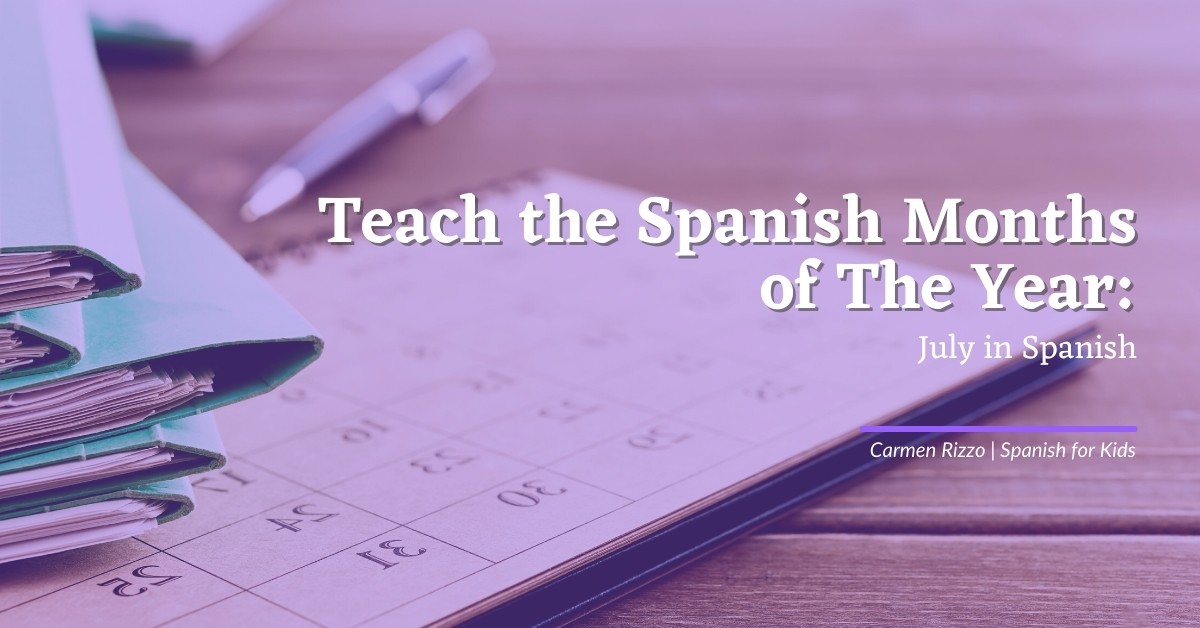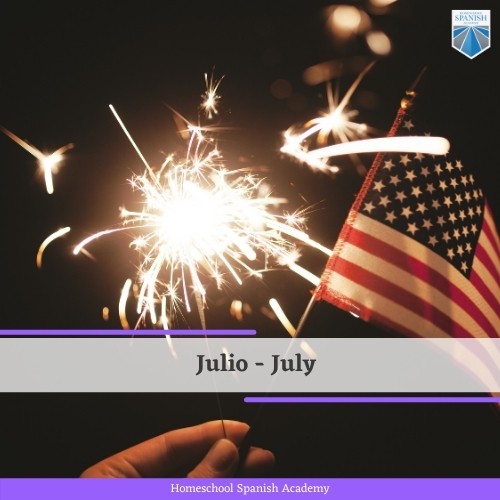
Teach the Spanish Months of the Year: July in Spanish
Julio or July in Spanish is the seventh month of the year in the Julian and Gregorian calendars. July has 31 days and marks the beginning of the second half of the year.
The original name of this month was “Quintilis,” but was renamed to “Julius” to honor Julius Caesar, who was born in this month. Later “Julius” evolved to July in English and Julio in Spanish.
Julio is the second month of summer in the northern hemisphere and is the hottest month of the year. July is known for it’s hot, humid days—known as “dog days”—which are the most uncomfortable of summer. Meanwhile, in the southern hemisphere, July is the second month of winter and one of the coldest of the year.
July is a month with important celebrations and commemorations, and being one of the hottest of the year, there are a lot of activities to do to enjoy the most of those hot, long summer days.
Celebrations During July in Spanish
Almost every one of the 31 days of July has a celebration all around the world, but because this article is to help you teach and learn about July in Spanish, this section will center around those celebrations observed in the American Continent and Spain. Let’s begin!
Día de la Independencia
El Día de la Independencia or Independence Day, is a yearly celebration that commemorates the separation of a country from another, and normally celebrates freedom and patriotism.
In several countries, el Día de la Independencia is a national holiday and people take the day to enjoy activities with their family and friends. Others prefer to attend marches and parades as a way to celebrate independence.
Some countries also commemorate their autonomy in July, instead of their independence.
Here is a list of those countries who have national holidays related to their independence or autonomy during July:
- Canada — July 1
- United States — July 4
- Venezuela — July 5
- Argentina — July 9
- Colombia — July 20
- Puerto Rico — July 25
- Peru — July 28

Here is some vocabulary to talk about independence and autonomy days during July in Spanish:
| Spanish | English |
| Las Fiestas Patrias | National Holidays |
| La Independencia | Independence |
| La Autonomía | Autonomy |
| El desfile | Parade |
| La marcha | March |
| Marchar | To march |
| La banda marcial | Marching band |
| El patriota | Patriot |
| La democracia | Democracy |
| La libertad | Freedom |
| Los fuegos artificiales | Fireworks |
| El día de campo | Picnic |
| La barbacoa | Barbeque |
| Independiente | Independent |
| Autónomo | Autonomous |
Sanfermines
The Sanfermines is a Spanish celebration that takes place in honor of Saint Fermin from Amiens, and is a yearly celebration that takes place in the Spanish city of Pamplona.
The Feast of Saint Fermin, another name for the Sanfermines, begins on the midday of July 6 with some fireworks in Pamplona´s town hall, and ends on July 14 at midnight while the attendants sing a song as a goodbye.
During the Sanfermines, people participate in different cultural and recreational activities. One of them was the Riau-Riau, a traditional, but unofficial act that consisted of a lot of people dancing a vals named La Alegría de San Fermín (Saint Fermin Happiness) in the streets near Pamplona’s town hall. Sadly, it stopped being part of the celebration since 1991.
Another of the most important activities during the Sanfermines is known as el encierro (the confinement), which are races that takes place every day of the duration of the Sanfermines and consists on people running a distance of 849 meters (0.52 miles) in front of 6 bulls and ends in the Plaza de Toros (bullring). They begin at 8 am of every day of the Sanfermines and don’t take more than 3 minutes to complete.
During the celebration of Sanfermines in Pamplona, the city goes from 280,000 inhabitants to 1,000,000 because of tourists and locals that go back to enjoy the celebration with their friends and family.
You can’t talk about July in Spanish without mentioning the Sanfermines, so here is a short list of word’s that can help you speak about this topic.
Please keep in mind that the some of this words are unique to Pamplona and this celebration:
| Spanish | English |
| El chupinazo | Firework |
| El pañuelico | A small red scarf typical of the attire of those that participate in the sanfermines. |
| La procesión | Procesion/Float |
| San Fermín | Saint Fermin |
| El toro | Bull |
| Correr | To run |
| El encierro | Confinement |
| Participar | To participate |
| Plaza de toros | Bullring |
| Los corredores | Runners |
| “Pobre de mi” | Poor me (A traditional song sing by those to attend the Sanfermines during the last day of the celebration) |
Día Internacional de la Amistad
Known as Friendship Day in English, this day was proposed in 1958 in Paraguay as the “International Friendship Day” and to this day is celebrated on July 20 in Argentina, Brazil, Spain, and Uruguay. In Bolivia, it is celebrated on July 23 and in Paraguay, on July 30.
In Latin America, it is a popular celebration and is the perfect reason for a friendly gathering with old and new friends. It became popular thanks to Enrique Ernesto Febbraro, an Argentinian dentist who had the idea to commemorate this day the same day Neil Armstrong got to the moon, as a unifying gesture between nations. He sent more than a thousand letters to different people in different countries around the world while Apollo 11 was still in space and received more than 700 responses and that kickstarted the celebration.
When you talk about July in Spanish, you have to talk about this celebration, especially with South Americans! So here is a small vocabulary about this interesting celebration:
| Spanish | English |
| La amistad | Friendship |
| Amigo/a | Friend |
| Amigable | Friendly |
| Los nuevos amigos | New friends |
| Los viejos amigos | Old friends |
| Los saludos | Greetings |
| Saludar | To greet |
| Los brazaletes de la amistad | Friendship bracelets |
| El mejor amigo/ La mejor amiga | Best friends |
| El apoyo | Support |
| Apoyar | To support |
| La confianza | Trust |
| Confiar | To trust |
| El consejo | Advice |
| Aconsejar | To advice |
| Preocuparse | To care for |
| El tiempo de calidad | Quality time |
| Llevarse bien | Get along |
| Pasar tiempo juntos | Spend time together |
| Mejor amigo/a para siempre | Best Friend Forever |
Activities To Do During July in Spanish
July is a month full of celebrations and commemorations, and that is the perfect excuse to do some interesting and entertaining activities to celebrate them!
1. Volei-toalla
July is a really hot month, giving you the perfect excuse to play water games with your friends and family! Voli-toalla is the combination of two words: Voleibol and Toalla (Volleyball and towel) and is an entertaining group activity to refresh for a little bit!
This instructions apply to play with 20 people:
¿Qué necesitas? — What do we need?
- 10 toallas grandes
10 big towels - Muchos globos con agua
A lot of water balloons
Instrucciones — Instructions
- Puedes jugar este juego con una net de verdad, o solamente dividiendo el espacio donde se llevará a cabo el juego.
You can play this game with an actual volleyball net or just dividing the space where the game will take place. - Divide a las 20 personas en dos equipos de 10 y cada equipo debe dividirse en 5 parejas.
Divide the 20 people in two teams of 10, and each team has to divide in couples. - Cada pareja debe tomar una toalla y estirarla agarrándola de los extremos. Esto servirá como para cachar los globos con agua.
Each couple has to take a towel, and stretch it by grabbing it from it’s extremes. This will be used to catch the water balloons. - ¡Es hora de jugar! Un equipo debe lanzar al otro un globo con agua usando la toalla como un propulsor y el otro equipo debe cachar el globo con la toalla, luego este equipo regresa el globo al otro. El equipo que explote menos globos gana.
Time to play! One team has to throw one water balloon to the other using the towel as a propeller and the other team has to catch the balloon with the towel. Then this team returns the balloon to the other and so on. The team that explodes the least balloons wins.
And the best part is that if there are a lot of leftover water balloons… you can always have a water balloon battle! So refreshing!
Here is a video as an example to play Volei-toalla.
2. Learn friendship quotes
As you know now, a lot of people in South America likes to celebrate friendship during July, so if you want to tell your Spanish speaker friends about how much you like them, or celebrate a second friendship day in the year, here are some Spanish phrases for you to learn:
1. Un amigo es alguien que nos conoce pero nos ama de todas formas. – Fr. Jerome Cummings
A friend is someone that knows us and still loves us.- Fr. Jerome Cummings
2. Quien encuentra un amigo fiel, encuentra un tesoro. – Proverbio Judío
Who finds a loyal friend, finds a treasure. – Jewish Proverb
3. Una amistad noble es una obra maestra a dúo. – Paul Bourget
A noble friendship is a duo masterpiece. – Paul Bourget
4. La amistad es un amor que no se comunica por los sentidos. – Ramón de Campoamor
Friendship is a love that is not communicated through the senses.- Ramon de Campoamor
5. Los amigos son necesarios para el gozo y para el dolor. – Samuel Paterson
Friends are necessary for joy and pain. – Samuel Paterson
Get The Most Of Your Summer!
Want to know the best of July? The days are longer and that means more time to learn Spanish! Be part of more than 24,000 monthly students in Homeschool Spanish Academy and practice your Spanish with a native Spanish speaker teacher! We have provided reliable service to Spanish learners for more than 10 years, and we want to teach you too! So sign-up for a 1-on-1 free Spanish class today and continue this amazing journey of learning a new language!

Want more free Spanish lessons, fun content, and easy learning strategies for kids? Check these out!
- Earth Day Projects for Kids + Spanish Earth Day Vocabulary
- How to Talk About the Temperature in Spanish: Fahrenheit, Celcius, and Descriptions
- Car Parts Spanish Vocabulary List: Learn Using Pictures
- Top 15 New Year’s Resolutions in Spanish
- Talk About Hurricanes And The Weather in Spanish
- Spanish Words with Multiple Meanings in Latin America
- World Mental Health Day: A Vocabulary Guide for Mental Health Workers
- 7 Powerful Reasons Why Bilingualism in Children MattersPowerful Reasons Why Bilingualism in Children Matters
- An Easy Vocabulary Guide to Describe the Post Office in Spanish - February 10, 2023
- Guatemala’s Biggest, Most Colorful Market: Chichicastenango - December 28, 2022
- 8 Sad Spanish Songs for When Your Heart Is Broken - December 6, 2022




